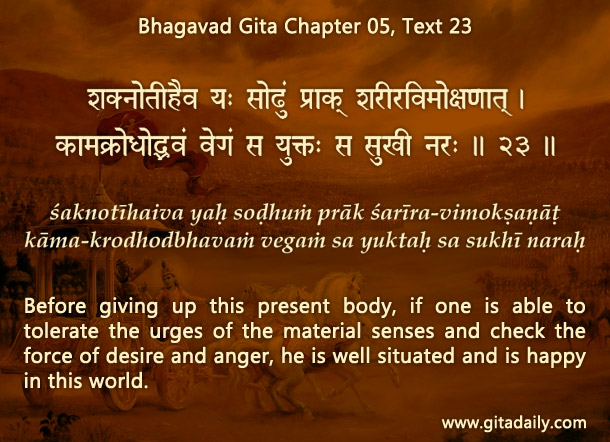One of the Bhagavad Gita’s most life-transforming insights is its clear, categorical, and consistent emphasis on differentiating between us and our mind. While some of us may consider this difference too philosophical a subject to interest us, the products of that understanding (or misunderstanding) will interest us greatly. Let’s consider just one of those products: desires.
What does saying that we are different from our mind imply, with regard to desires? It implies that we are different from our desires. We are spiritual beings situated in a material machine made of a gross body and a subtle mind. Desires can be seen as our mind’s default reactions to objects that seem attractive. Even if we can’t control the desires that pop up in our mind, we can still control how we as souls respond to those desires.
Gita wisdom helps us become detached observers of our desires, wherein we learn to see the rising of the desire for a particular object in the same neutral way as we see the rising of our body temperature when the weather becomes hot. Just as we don’t let the temperature be the sole factor in our decision-making, we don’t let our desires gain monopoly over our decision-making. This is what the Bhagavad-gita recommends in (05.23) when it urges us to see desire as simply a biological reaction to our embodied condition and to thereby live with it without living for it.
When we learn to observe our desires objectively, we can respond to them based on our higher purpose. Having a higher purpose means having a strong sustained systematic desire for something higher in our life. What if we don’t experience much desire for that higher purpose or worse still experience an opposite desire? Remembering that we are different from our desires, we can choose to focus our attention on that higher purpose, thereby kindling some small desire for it.
When we thus dwell on what we desire to desire, that higher desire will become stronger. Over time, it will overrule and outlaw our lower desire, thereby powerfully propelling us toward our ultimate good.
Summary:
We are defined not by what we desire, but by what we desire to desire.
Think it over.
- How does the Bhagavad-gita change our vision of desires?
- What is the difference between what we desire and what we desire to desire?
- How can you strengthen your higher purpose?
***
05.23: Before giving up this present body, if one is able to tolerate the urges of the material senses and check the force of desire and anger, he is well situated and is happy in this world.
Audio explanation of the article is here: https://gitadaily.substack.com/p/why-we-are-not-defined-by-our-desires

To know more about this verse, please click on the image

Wonderful insight Prabhu.
“Prak Sareera Vimokshnaath” – if we are slaves to desires and Anger in this life time, death is not going to fix that. WE will carry those samskaras and will be reborn to pander to those lingering desires and anger. Hence our dear Lord Bhagawan Srikrishna is saying we have to reform ourself and strengthen our internal will while we are still alive here.
Vegam: among the 6 negative qualities (Kama, krodha moha lobha, mada matsaryams) The most dangerous ones are Kama Krodha and they surface in our mind at great speed (Vegam). Other qualities take shape slowly. relevant to this is
(3.37) Kama esha krodha esha rojo guna samudbhavah. Mahasano mahapapma viddehna iha vairinam. These two are the real enemies and difficult to satisfy, all devouring and cause great damage.